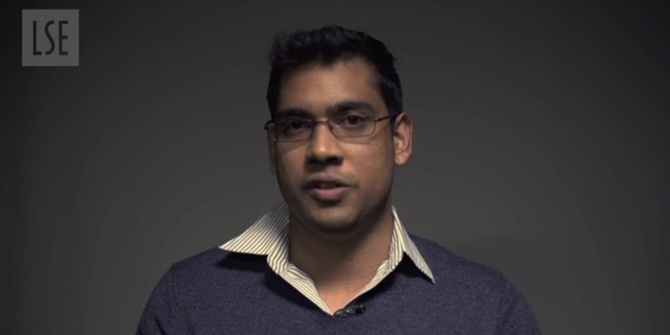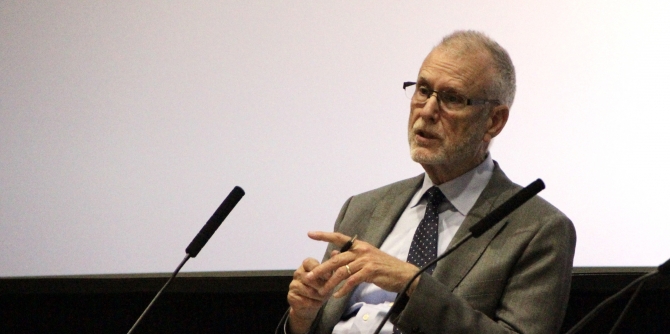 Dr Lucia Garcia discusses the challenges facing entrepreneurship for the older unemployed, where the transition from unemployment to self-employment is more fragmented and fraught with difficulties than entrepreneurial narratives portray.
Dr Lucia Garcia discusses the challenges facing entrepreneurship for the older unemployed, where the transition from unemployment to self-employment is more fragmented and fraught with difficulties than entrepreneurial narratives portray.
The UK is facing an increasingly ageing population that brings big economic burdens in pension and medical provisions while tax contributions diminish. This situation has become worse since the start of the 2008 global financial crisis as almost 1 million people aged 50-64 have become ‘involuntarily jobless’ during this period. A growing number of public institutions are promoting entrepreneurial activities among the older unemployed as a partial solution to these challenges. Yet, despite Government support and positive press campaigns; the uptake of entrepreneurial activities among the older unemployed is not as successful as expected. Most older ‘necessity entrepreneurs’ do not identify themselves with the institutionalized narrative of the entrepreneur as the young, empowered, creative and independent individual who ‘puts an innovative product in the market’. It is necessity, rather than opportunity, that is pushing them to become entrepreneurial. Their transition between unemployment and self-employment or entrepreneurship seems also more fragmented and fraught with difficulties than official narratives outline.
Since the start of the 2008 global financial crisis, public discourse has increasingly sought to position entrepreneurship as the panacea for unemployment, presenting entrepreneurship as both socially desirable (an attractive employment option) and socially feasible (an accessible and realistic employment option). In this post-crisis pro-entrepreneurial context, ‘necessity’ entrepreneurs have come to represent around 30% of all entrepreneurs across OECD countries. Yet, as the term ‘necessity entrepreneur’ infers, it is necessity, rather than opportunity, that is pushing, rather than pulling, them to become entrepreneurial, and the transition they experience is poorly understood. Indeed, necessity entrepreneurs are very much under-researched in academic literature, not to mention practically ignored by the media and the policy-makers.

Traditionally, ‘older’ people (50-75 age group) have expressed only moderate interest in entrepreneurship due to worries about health, energy levels and a reluctance to take on financial risks at older age. This is supported by research that shows that as people get older they are less willing to commit to starting a new business because of ‘yield returns over time’. Yet, the long recession and the economic downturn have forced changes in outlook and attitude. Alongside the fragmentation of old certainties, the ‘grey’ unemployed find themselves now responsible for creating their own jobs as well as for taking themselves through the transition between unemployment to self-employment, all with limited or no support. Further, not only are the older unemployed to take on the risks associated with starting up a business, along with the pressure to live up to the ideal of the exemplar entrepreneur, but they are also doing so in a context of personal crisis and economic uncertainty.
It does not help that most of the stories we hear about entrepreneurs focus on the youngish exemplar individual who, as a hero (e.g. Mark Zuckerberg co-funder of Facebook who already has his own Hollywood biopic) or a jester (think Michael O’Leary Ryanair’s CEO), achieves success and wealth. This narrative rests heavily on early work by Schumpeter (1939) that first emphasized the role of entrepreneurs in economic theory, endowing them with a drive to power and an intuitive insight that he saw as ‘instinctive’. The all-encompassing power of this narrative leads to a sense of failure when potential entrepreneurs struggle to engage with the process and to live up to that ideal, especially in economically uncertain times.
We really need to have a hard look at the way we represent and support potential would-be entrepreneurs. A good first step would be to tackle the dominant view inherent in the ‘holy trinity’ of the entrepreneur i.e., the strong figure of the entrepreneur and the development of an ‘entrepreneurial self’, the unrelenting dig to uncover the ‘secret to success’, and the optimistic policy-making grounded in the assumed entrepreneur’s role in economic success. Such questioning would open up further the study of entrepreneurs and the entrepreneurship process as well as its impact on social change and innovation beyond the current exclusive focus on wealth creation, while at the same time allowing for the possibility of re-balancing the interpretation of ‘who can be an entrepreneur’ and how to study the phenomenon.
About the research
An LSE research team based on the Social Psychology department, coordinated by Dr Lucia Garcia-Lorenzo and funded by STICERD is currently looking at the micro-interaction between older necessity entrepreneurs and their situation, as well as at the macro-representation of entrepreneurs in the institutional and public sphere. The aim is to give voice to alternative realities of entrepreneurship and to broaden the understanding of entrepreneurship to eventually positively inform both policy and available support.
About the researcher
Dr Lucia Garcia-Lorenzo has a BA and an MSc in Psychology from Universidad del Pais Vasco, Spain; a PhD in Social Psychology from LSE and a PgCert from the Institute of Group Analysis (IGA). She is Director of the LSE’s MSc in Organisational and Social Psychology and coordinator of the Organisational Research Group (ORG). She specialises in cultural change in organisations after a major transition. She has taken part in a number of research and consultancy projects focused on change in organisations in different contexts. She is currently looking at the particularly difficult transitions between work, unemployment and entrepreneurship in different EU countries.





